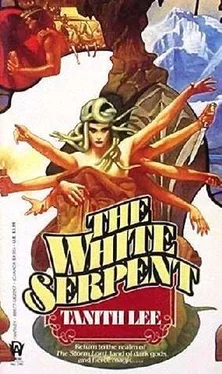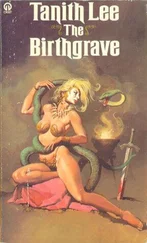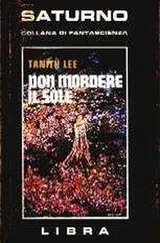Yennef grinned. “You find me suitable.”
“On reflection, not. It would be better, I think, to manumit you and let you go.”
The grin fell from his face They gazed each other out. It was fine to have before her a man prepared to do this, eye for eye.
“Why?” he said. Then, remembering Iscah, “You paid your lord’s cash for me. What will he say?”
Recklessly she answered, “It’s a feast of Cah. Gifts are exchanged, sometimes they free slaves and prisoners. I’ll tell him this was an offering on his behalf. He’s a priest. It will look pious, and also display that he’s rich.”
“Oh, no,” he said. “He’ll have your silky hide.”
“Oh, no,” she repeated. She said, without pride, “I can usually make him do what I want.”
Yennef considered. He said, “But you still look made of silk.”
She stared back.
“If you need a woman,” she said, “I’ve no objections to your having one of the kitchen girls, before you leave.”
“Those little rounded wobbly stuffed cushions? That will be nice.”
Panduv said, briskly, “I’ve already sent for the clerk. The deed of manumission will need to be written and sealed quickly. At sunset all business stops, for the festival.”
“And you have use of his seal, as of his coffers, this malleable master of yours.”
“The Lord Arud is sometimes away at the temple two or three days together. I regulate his house.”
“And after the clerk, what?”
“You’ll be given provisions and set on your road.”
He said, “I’ve forgotten which road that was.”
Suddenly the attractive nonchalance and swagger went from him. His broad shoulders bowed and he hung his head. For an instant a look of bitterness and frustrated gnawing grief got hold of his face. Then these, too, seemed to drain out of him, as if he no longer had the stamina to effect them. She recalled, he was older than Rehger, almost twice his years, maybe, and had been cooped for six months or more on a Zakorian pirate galley.
“Sit there,” she said, and when he had done so, she brought him wine and served him, as if he were a master of Iscah and she a dutiful woman.
A minute later (they had not spoken any more, except that, un-Iscaian, he thanked her again), the clerk was sent in with his papers and case of ink and wax.
Panduv was sorry. She was more sorry than was comfortable at the swift curtailment of this interlude.
He had lost all track of time, nearly of all things, on the galley. That was normal. To survive, less so. It was Galutiyh the Dortharian who had rendered him to the pirates. Yennef had not been thrown from the trail of Galut and his dross, and of Yennef s son riding with them. Yennef had sensed the false leads in Xarabiss, but not been able to get over the water in proper order to keep up. That was luck proving flighty, as it always had. Then a series of mishaps occurred on the way to Zaddath—which was where he knew, by then, they must be heading. Some of the delays might have been fashioned by Galutiyh—lame mounts, felled trees, obliterated paths. Or not, depending on the dedication of ill-fortune. Then again, maybe it was only bloody Anackire, working out her scheme-dream of the world.
Galutiyh’s men ambushed Yennef in the rough country around Ilva. Galutiyh had his score to settle. There were beatings and other games. In the end, dizzy and carefree from swamp fever, Yennef beheld himself, from some distance up in the air, being traded to black men with smashed faces, whose long low ship flew a tattered doubled-moon and dragon. They were not far from old Hanassor, one gathered from the talk. Free Zakorian reavers. He gave himself over as done for.
He had already, somewhere or other, apologized to Rehger for non-utility. Well, his son would expect nothing of him. His son. In the gut of the stinking black galley, Yennef had visions of Rehger—torn apart on a machine of torture, poling upriver between mountains, in a jungle, a king in a chariot riding to war, standing among white towers of marble.
Finally, Yennef believed that Rehger was dead, and believing it, most of the anguish dimmed. How could you mourn and rage over something to which you had no rights? Besides, it might all have turned out otherwise. Yennef, condemned to die in the pit of the galley, need not trouble.
But nourished on the gangrenous meat and vermin-nous bread-slabs and diseased water, rowing in the boiling ship belly, men perishing around him, endlessly cut by fire—the tongues of whips—expecting always no tomorrow, his fever abated or was amalgamated into him, and Yennef lived. And then came a night of furious rowing, the Zakor seeking to evade a Vardian patrol with a Shansarian captain out of Sh’alis, sea-wise and angry. Chased up the lawless coast almost into Hanassor’s rocky cliffs, the Zakorians discovered themselves trapped between their pursuer and another waiting Vardian. The pirate was rammed.
As she was sinking, blond men came down into the howling hell of the rowers’ deck and broke the shackles.
It transpired Yennef was now the property of Vardians. They knew him for a Lan, but were not overwhelmed by former ties of friendship. They shipped him across to Iscah in the intestines of a merchant vessel, not rowing, simply bolted fast to the planks. From the port, his gang and a couple of others were marched to the capital. They were not worth much, and the mix now in charge of them had no patience. When men died they were tossed off the road into ditches. This was Iscah. And there were plenty of crows.
Gaining the market, Yennef was cheerful. He had gone by most other emotions, save contempt—of self and every other.
He knew of Cah—of course, his past had taught him, a million years before, in a mountain hovel in the snow. And all at once there Cah was, gliding through the slave-auction. Crow-black herself, wand-slim in her gauzes, with a silver wristlet and necklaces of ivory.
And Cah spoke to the auctioneer and Cah brought Yennef to this house on the hill. Cah, quite properly, was the lover of a high priest and would make the man do what she choose. Cah had let Yennef free. In her presence then, the backbone of indifference crumbled.
The Lan was not wholly sane, she saw that now. It was not a rowdy or pernicious madness, gentle, rather. Perhaps it would subside. But the cause seemed deeper, older than the reavers’ ship.
Best, would be to send him out in the early morning, before the sun rose on Cah’s festival. He could bribe the city gate, and Arud’s seal would settle any argument. She could not give Yennef a mount, but with the provided coins doubtless he could come on one. She believed what he had said, about the Lannic royal line. Rehger had had this princely look about him, too. She could have supposed them related, the Lan, the Lydian, but Rehger had been birthed from a witch girl and an itinerant in the jumble of the Iscaian mountains.
The business with the clerk was slowly got through, in Arud’s name. In law no woman could do anything, and the clerk, seen to with a double fee, conducted the affair as if an invisible Arud were at his elbow. When everything was accomplished, Panduv sent the Lan to one of the guest cells that opened on the altar-court. It was a ridiculous excess of hospitality, as buying and freeing him had been. This did not seem important, nor Arud’s reaction to the news, which she could hardly deny him, seeing the legalities were for public record, and meanwhile the entire house was primed.
Arud’s return (tomorrow’s midnight, drunken and slack from the temple mysteries which involved both blood sacrifice and carnal orgy), felt far off, as if to be located in another decade.
She had given instructions to the villa servants concerning the man Yennef’s comfort. At the correct hour, one of the boys should go to rouse him for departure.
Читать дальше












